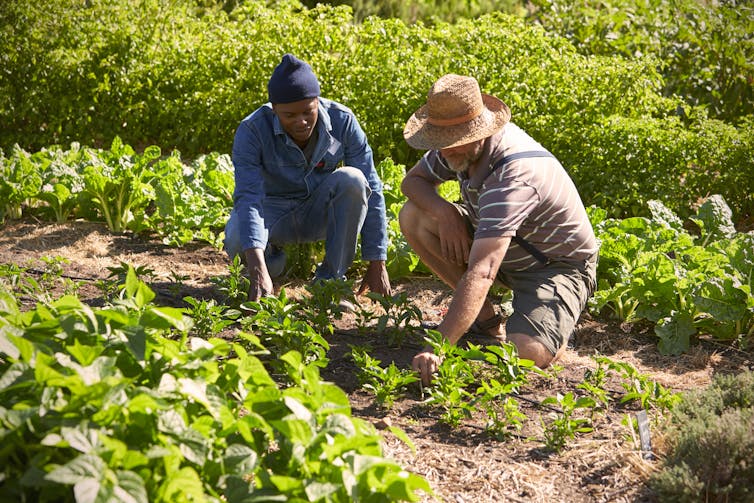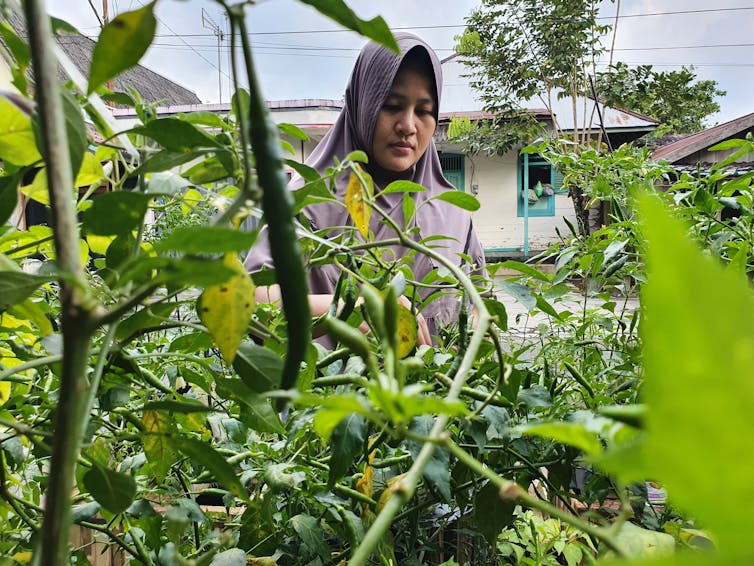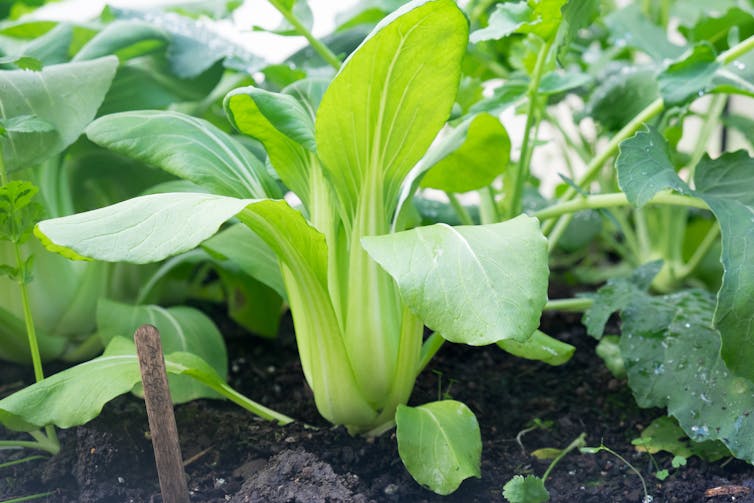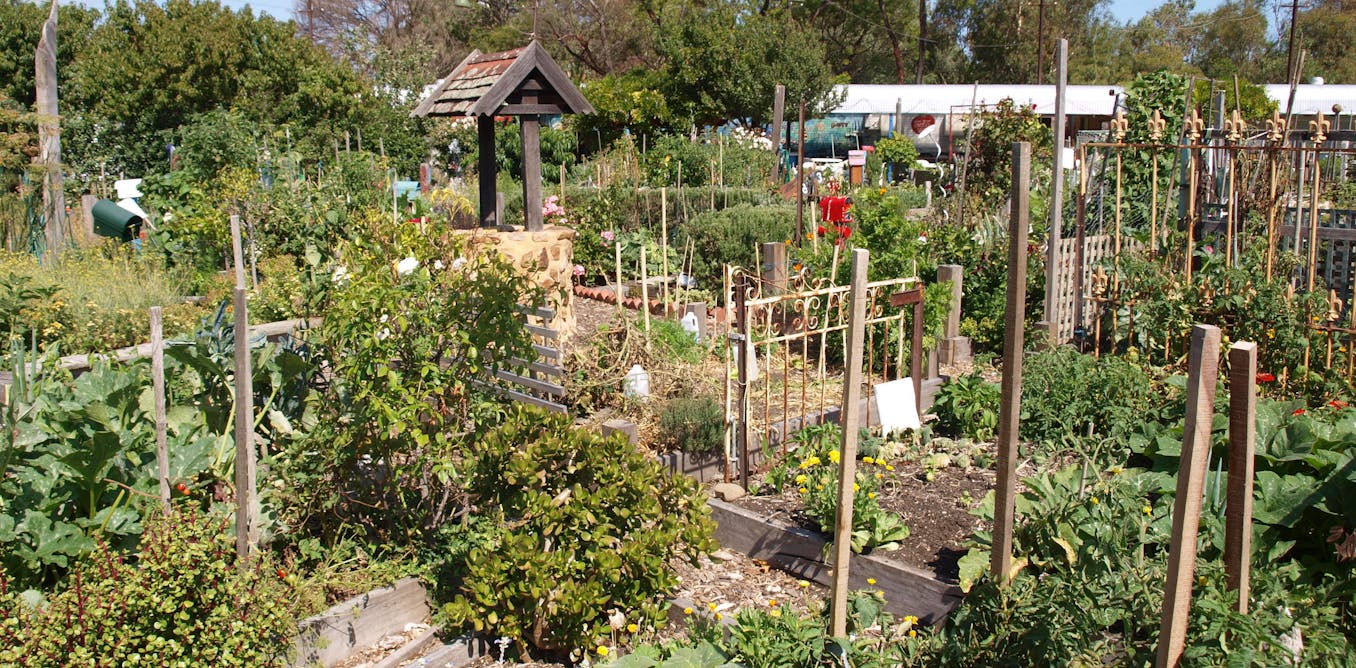[ad_1]
With a whole lot of 1000’s of Australians enduring lockdown however as soon as extra, you could be trying to find solace in gardening. For migrants and refugees in Australia, gardening could also be notably important when shared in group areas.
Nevertheless group gardens aren’t always web sites of inclusion. In our not too way back printed evaluation, my colleagues and I highlight the strategies migrants and refugees are excluded from group gardens — and learn how to alter this.
When group gardens are socially inclusive, all people benefits. Culturally numerous group gardens cannot solely deepen cross-cultural social connections, they’ll even help develop the skills to adapt to range and catastrophe, akin to from native climate change.
The benefits of group gardens
Prepared lists to affix group gardens are terribly prolonged in numerous parts of Australia, with some gardens requiring as a lot as an eight-year wait. Advocacy groups persistently identify for additional web sites and better financial help to fulfill this demand.
There are good causes for his or her rising fame. Improved psychological and bodily nicely being and wellbeing typically tops the document of their optimistic impacts, as they promote additional practice, greater entry to nutritious meals, strengthen group connections, and additional.
Study additional:
Inexperienced for wellbeing – science tells us learn how to design metropolis areas that heal us
The meals grown in group gardens can also help improve meals security. All through lockdown, these web sites have been crucial to fulfill the regularly needs of many affected by financial hardship.
For refugees and migrants, communal gardening web sites could also be therapeutic, protected areas.
When immersed in supportive communities that share a dedication to productive gardening, migrants and refugees can improve their self-efficacy. The ability to develop culturally acquainted meals can also hold their connections to homelands, easing the resettlement and migration course of.

Communal gardens must be protected areas.
For that reason it’s so important to boost these alternate options and take away any limitations excluding these gardeners. Our evaluation reviewed worldwide analysis of group gardens, and positioned frequent limitations to refugee and migrant participation revolve spherical three key areas:
1. Bodily and supplies choices of gardens
This consists of extreme membership fees, incapability to easily journey to gardens and insecure land tenure.
Web site design that limits gardeners’ autonomy and talent to develop acquainted meals will also be a difficulty. This may happen the place there’s communal, considerably than explicit individual, plot cultivation, inserting pressure on new gardeners to develop meals already well-known to present gardeners.
One different barrier is a shortage of obtainable space and small plot sizes, which could make it extra sturdy to develop culturally important crops, akin to maize.
2. Yard administration sorts
Inclusive practices are typically not embedded into data sharing and selection making, akin to not translating data.
For example, group gardens sometimes rely upon formal administration conferences, nevertheless these couldn’t think about fully totally different languages, cultural traditions and unequal vitality relations.
Relying on group gardens for meals security could be a large draw back for refugees and migrants, notably for model new arrivals. This may lead to gardens altering additional holistic social help functions.
Study additional:
Understanding of points to do in isolation? Get once more throughout the yard with these ideas from 4 consultants
3. Privileging particular values and aesthetics
The way in which wherein we glance after gardens and ideas about how a productive yard must look, are typically fashioned by regardless of cultural norm is dominant. Uniform, neatly mulched raised beds, free of weeds and overhanging vegetation, are typically favoured by menace averse councils.
Migrant and refugee gardening sorts could also be at odds with accepted expectations and values like these. Many are used to cultivating immediately into the soil and prefer to develop all types of crops collectively that won’t look neat, nevertheless can enhance biodiversity. They may moreover go away additional house between crops to boost yield.
This means these acquainted, productive and culturally relevant strategies of gardening for refugees and migrants could also be devalued and excluded, along with their skills and information.

Volunteer groups managing group gardens must be give additional belongings.
The good news is we’ll make group gardens additional socially inclusive places. To try this, there should be additional funding from governments and native councils in belongings (along with land and financial help) for the largely volunteer groups rising and managing these web sites.
These belongings need to assist migrants and refugees to:
- develop social and ecological connections that engender a means of belonging
- contribute to the design and administration of gardens in culturally and linguistically inclusive strategies
- make selections about learn how to tend their plots that permit some connection to their homeland
- interact with totally different yard members from all backgrounds to share information and lessons
- not should rely upon the yard as a major provide of meals or earnings know-how.
Gardens are greater when migrants and refugees are included
Neighborhood gardens are at current off limits to many beneath lockdown. After we return to COVID-normal, the teachings from socially inclusive gardens might help communities greater put collectively for future disruption, notably from native climate change.
Study additional:
From veggie gardening to op-shopping, migrants are the quiet environmentalists
Resettlement in a definite nation contains ongoing modifications to new social, ecological and native climate conditions. We’re capable of all examine from migrant and refugee skills, information, and the strategies they adapt, as adjustment to unfamiliar environments sometimes comes with cautious tinkering and trial and error.
Close to meals gardens, earlier evaluation has confirmed this experimentation can lead to boosting biodiversity and growing diets, on account of variety of crops grown. One occasion is the introduction of maize to provide maize flour in numerous gardens all by Australia. It’s a weight reduction plan staple for lots of African nations.

The necessity to develop meals from the homeland can lead to gardening strategies which will preserve future changes in native climate.
The necessity to develop culturally associated meals means tinkering with soil and rising conditions, along with the crops themselves. This allows the crops to adapt to unfamiliar conditions, which might grow to be increasingly variable beneath native climate change. Learning learn how to develop tropical crops in frosty parts of Victoria or on marginal soils are just a few good examples.
What’s additional, gardeners from numerous backgrounds can enhance a gaggle’s repertoire of protected, low-tech cultivation and pest administration strategies. This consists of learn how to learn from the waste from culturally acquainted meals, akin to Japanese gardeners’ use of tofu residue as a soil conditioner.
Not solely will bringing collectively culturally numerous group members foster additional important connections, however moreover it ought to strengthen our shared means to adapt to the uncertainty of a altering native climate.
The creator need to acknowledge Jessica Abramovic and Cathy Hope who helped compile the evaluation upon which this textual content is based.
[ad_2]
